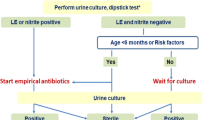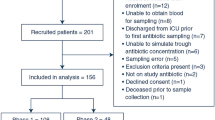Abstract
Purpose
There is a paucity of data regarding the utility of routine urine cultures in adults with febrile neutropenia (FN) without urinary symptoms receiving protocolised antibiotics. This is reflected by inconsistent recommendations in international and regional FN guidelines. We addressed this issue by retrospectively reviewing the impact of routine urine cultures on antibiotic management in haematology cancer inpatients at a tertiary hospital.
Methods
All haematology inpatients over a 5-year period (2011–2015) were retrospectively reviewed for episodes of FN (neutrophil count < 0.5 × 109/L and fever > 37.5 °C). For each episode, demographic data, urinary tract symptoms and signs (absence of which was termed ‘asymptomatic’), urinalysis and urine culture results, antibiotic therapy and duration, and patient outcomes were collected. A urine culture was considered positive if > 105 colony forming units (CFU)/L were detected. Empiric antibiotic therapy for FN consisted of intravenous piperacillin/tazobactam in stable patients, with the addition of vancomycin and a single dose of gentamicin if systemically compromised.
Results
Four hundred and thirty-three episodes of FN were identified in 317 patients. Urine cultures were performed in 362 (84%) episodes. Cultures were positive in 9 of 48 (19%) symptomatic episodes versus 8 of 314 (2.5%) asymptomatic episodes (RR = 7.4, p < 0.0001). A change in antibiotic management due a positive urine culture occurred in only 5 episodes (1.4%): 3 of 48 (6.3%) symptomatic and 2 of 314 (0.6%) asymptomatic episodes respectively (RR = 9.8, p = 0.01).
Conclusion
Routine urine cultures in FN patients without urinary symptoms who are already receiving protocolised broad spectrum antibiotics rarely impact subsequent antibiotic management.
Similar content being viewed by others
References
Freifeld AG, Bow EJ, Sepkowitz KA, Boeckh MJ, Ito JI, Mullen CA, Raad II, Rolston KV, Young JA, Wingard JR, Infectious Diseases Society of Americaa (2011) Clinical practice guideline for the use of antimicrobial agents in neutropenic patients with cancer: 2010 update by the Infectious Diseases Society of America. Clin Infect Dis 52:427–431
Klastersky J, de Naurois J, Rolston K, Rapoport B, Maschmeyer G, Aapro M, Herrstedt J, ESMO Guidelines Committee (2016) Management of febrile neutropaenia: ESMO clinical practice guidelines. Ann Oncol 27:v111–v1v8
Masaoka T (2004) Evidence-based recommendations for antimicrobial use in febrile neutropenia in Japan: executive summary. Clin Infect Dis 39:S49–S52
Speers D (2010) Febrile Neutropenia Management Guideline. http://scghed.com/. Accessed 1 December 2017
South Australian expert Advisory Group on Antimicrobial Resistance (2017) Febrile Neutropenia Clinical Guideline (Adults). http://www.sahealth.sa.gov.au/. Accessed 10 December 2017
Potter V, Holden S (2015) Guideline for the Management of Febrile Neutropenia in Adult Oncology Patients. https://www.nuh.nhs.uk/. Accessed 15 November 2017
Alberta Health Services (2014) Management of Febrile Neutropenia in Adult Cancer Patients. https://www.albertahealthservices.ca/. Accessed 2 October 2017
Canberra Hospital and Health Services (2018) Febrile Neutropenia Management. http://www.healthactgovau/sites/default/files//new_policy_and_plan/Febrile Neutropenia Managementdoc Accessed 15 May
Chan W (2016) Urine cultures. In: Leber A (ed) Clinical microbiology procedures handbook, 4th edn. ASM Press, Washington 3.12.6
Altman DG, Bland JM (2003) Interaction revisited: the difference between two estimates. BMJ 326:219
Multinational Association of Supportive Care in Cancer (2017) MASCC FN risk index score. http://www.masccorg/mascc-fn-risk-index-score Accessed 2 February
Wong M, Barqasho B, Öhrmalm L, Tolfvenstam T, Nowak P (2013) Microbial translocation contribute to febrile episodes in adults with chemotherapy-induced neutropenia. PLoS One 8:e68056
Steinrucken J, Pabst T, Zimmerli S, Marschall J (2016) Low impact of urine cultures as a diagnostic tool in patients with neutropenic fever. Infect Dis (Lond) 48:872–874
Hooton TM, Roberts PL, Cox ME, Stapleton AE (2013) Voided midstream urine culture and acute cystitis in premenopausal women. N Engl J Med 369:1883–1891
Weinkove R, Clay J, Wood C (2013) Temperature management in haematology patients with febrile neutropenia: a practice survey. N Z Med J 126:62–73
Frimodt-Møller N (2002) Correlation between pharmacokinetic/pharmacodynamic parameters and efficacy for antibiotics in the treatment of urinary tract infection. Int J Antimicrob Agents 19:546–553
Klaassen IL, de Haas V, van Wijk JA, Kaspers GJ, Bijlsma M, Bokenkamp A (2011) Pyuria is absent during urinary tract infections in neutropenic patients. Pediatr Blood Cancer 56:868–870
Author information
Authors and Affiliations
Corresponding author
Ethics declarations
The study was approved by the institutional review board (LNR/15/AUSTIN/431).
Conflict of interest
SG, PD, DJ, ZL, OE, and AP declare no conflict of interest. EH: Research funding: BMS, Merck Serono, Celgene, and Merck Sharpe Dohme. Advisory board: BMS, Janssen, Celgene. Honoraria: Roche, BMS, and Janssen. Travel expenses: Takeda, Roche, and Janssen.
Electronic supplementary material
ESM 1
(DOCX 121 kb)
Rights and permissions
About this article
Cite this article
Grigg, S.E., Date, P., Loh, Z. et al. Urine cultures at the onset of febrile neutropenia rarely impact antibiotic management in asymptomatic adult cancer patients. Support Care Cancer 27, 1223–1227 (2019). https://doi.org/10.1007/s00520-018-4476-7
Received:
Accepted:
Published:
Issue Date:
DOI: https://doi.org/10.1007/s00520-018-4476-7




